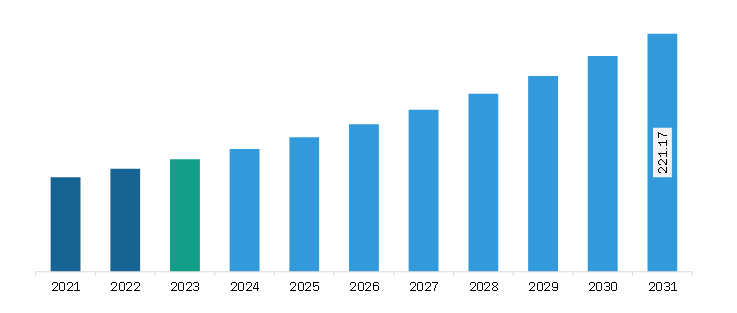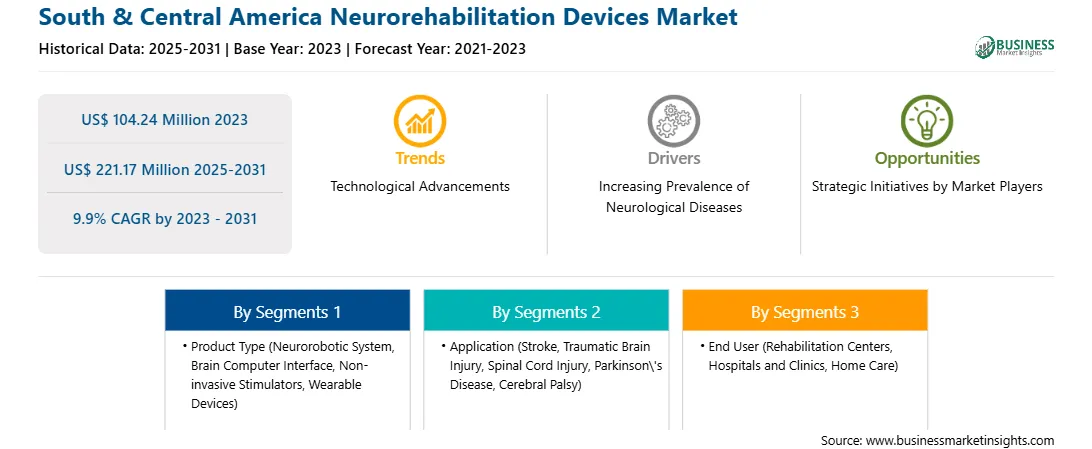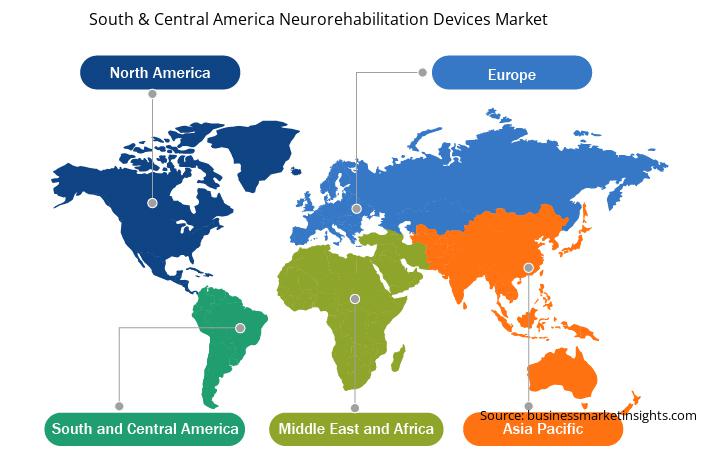The South & Central America neurorehabilitation devices market was valued at US$ 104.24 million in 2023 and is expected to reach US$ 221.17 million by 2031; it is estimated to register a CAGR of 9.9% from 2023 to 2031.
Strategic initiatives taken by market players, such as mergers, acquisitions, partnerships, and collaborations, are likely to accelerate innovation, develop expertise, and expand market reach.
In April 2022, Blackrock Neurotech partnered with Phantom Neuro, a neurotech startup, to carry out R&D for Phantom Neuro’s patent-pending Phantom X system, which offers patients highly accurate, almost real-time control of current and next-generation assistive devices, such as prosthetics and exoskeletons. This R&D partnership allows Phantom to use Blackrock's decades of experience in neurotechnology and develop biocompatible implantable sensors to complement and bolster the Phantom X platform.
In December 2022, Ekso Bionics—a leader in exoskeleton technology for medical use—announced the acquisition of the Human Motion and Control (“HMC”) Business Unit from Parker Hannifin Corporation. This acquisition will enhance Ekso’s product portfolio and improve its strategic relationships with commercial and research partners such as Vanderbilt University. The partnership with Vanderbilt is expected to enhance its research capabilities and product development.
Thus, the strategic initiatives taken by the market players are likely to create lucrative opportunities for the neurorehabilitation market in the near future.
The South & Central America neurorehabilitation devices market is segmented into Brazil, Argentina, and the Rest of South & Central America and Brazil hold the largest market share. The prevalence of a few neurological diseases has been associated with the aging population in Brazil. According to the Pan American Health Organization in 2022, the country has more than 30 million older adults aged 60 years and above, representing 13% of the country's population. By 2030, the number of people from this age group will reach nearly 50 million, which will be 24% of the total Brazilian population. The World Health Organization (WHO) and the Brazilian Institute of Geography and Statistics reported that the geriatric population in Brazil (aged 60 years and older) is expected to reach ~55 million by 2040. Thus, the increasing incidences of neurological diseases, such as Parkinson's disease, are likely to propel the demand for neurorehabilitation in the coming years. Many institutes in Brazil are working toward the growth of neuroscience in Brazil.
Strategic insights for the South & Central America Neurorehabilitation Devices provides data-driven analysis of the industry landscape, including current trends, key players, and regional nuances. These insights offer actionable recommendations, enabling readers to differentiate themselves from competitors by identifying untapped segments or developing unique value propositions. Leveraging data analytics, these insights help industry players anticipate the market shifts, whether investors, manufacturers, or other stakeholders. A future-oriented perspective is essential, helping stakeholders anticipate market shifts and position themselves for long-term success in this dynamic region. Ultimately, effective strategic insights empower readers to make informed decisions that drive profitability and achieve their business objectives within the market. The geographic scope of the South & Central America Neurorehabilitation Devices refers to the specific areas in which a business operates and competes. Understanding local distinctions, such as diverse consumer preferences (e.g., demand for specific plug types or battery backup durations), varying economic conditions, and regulatory environments, is crucial for tailoring strategies to specific markets. Businesses can expand their reach by identifying underserved areas or adapting their offerings to meet local demands. A clear market focus allows for more effective resource allocation, targeted marketing campaigns, and better positioning against local competitors, ultimately driving growth in those targeted areas.
South & Central America Neurorehabilitation Devices Strategic Insights

South & Central America Neurorehabilitation Devices Report Scope
Report Attribute
Details
Market size in 2023
US$ 104.24 Million
Market Size by 2031
US$ 221.17 Million
Global CAGR (2023 - 2031)
9.9%
Historical Data
2025-2031
Forecast period
2021-2023
Segments Covered
By Product Type
By Application
By End User
Regions and Countries Covered
South & Central America
Market leaders and key company profiles
South & Central America Neurorehabilitation Devices Regional Insights

The South & Central America neurorehabilitation devices market is categorized into product type, application, end user, and country.
By product type, the South & Central America neurorehabilitation devices market is segmented into neurorobotic system, brain computer interface, non-invasive stimulators, and wearable devices. The brain computer interface segment held the largest share of the South & Central America neurorehabilitation devices market share in 2023.
In terms of application, the South & Central America neurorehabilitation devices market is segmented into stroke, traumatic brain injury, spinal cord injury, parkinson's disease, cerebral palsy, and others. The stroke segment held the largest share of the South & Central America neurorehabilitation devices market share in 2023.
By end user, the South & Central America neurorehabilitation devices market is segmented into rehabilitation centers, hospitals & clinics, and home care. The hospitals & clinics segment held the largest share of the South & Central America neurorehabilitation devices market share in 2023.
Based on country, the South & Central America neurorehabilitation devices market is segmented into Brazil, Argentina, and the Rest of South & Central America. Brazil segment held the largest share of South & Central America neurorehabilitation devices Market in 2023.
Abbott Laboratories; BIONIK; BioXtreme Ltd; Blackrock Microsystems Inc; Ekso Bionics Holdings Inc; EMOTIV; Hocoma AG; Medtronic Plc; Renishaw Plc; and Tyromotion GmbH are some of the leading companies operating in the South & Central America neurorehabilitation devices market.
The South & Central America Neurorehabilitation Devices Market is valued at US$ 104.24 Million in 2023, it is projected to reach US$ 221.17 Million by 2031.
As per our report South & Central America Neurorehabilitation Devices Market, the market size is valued at US$ 104.24 Million in 2023, projecting it to reach US$ 221.17 Million by 2031. This translates to a CAGR of approximately 9.9% during the forecast period.
The South & Central America Neurorehabilitation Devices Market report typically cover these key segments-
The historic period, base year, and forecast period can vary slightly depending on the specific market research report. However, for the South & Central America Neurorehabilitation Devices Market report:
The South & Central America Neurorehabilitation Devices Market is populated by several key players, each contributing to its growth and innovation. Some of the major players include:
The South & Central America Neurorehabilitation Devices Market report is valuable for diverse stakeholders, including:
Essentially, anyone involved in or considering involvement in the South & Central America Neurorehabilitation Devices Market value chain can benefit from the information contained in a comprehensive market report.